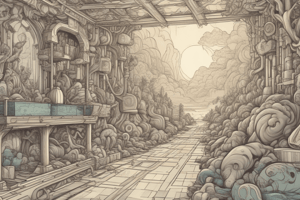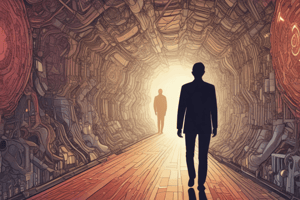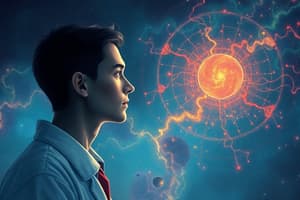Podcast
Questions and Answers
Define schizophrenia.
Define schizophrenia.
Schizophrenia is a common type of psychosis characterized by hallucinations and/or delusions.
What is tardive dyskinesia?
What is tardive dyskinesia?
Tardive Dyskinesia is a syndrome of potentially irreversible, involuntary movements that may develop in patients treated with antipsychotic drugs.
Differentiate between typical antipsychotics and atypical antipsychotics.
Differentiate between typical antipsychotics and atypical antipsychotics.
Typical antipsychotics are older, first-generation medications that often result in greater incidences of EPS and seldom impact 'negative' symptoms. Atypical antipsychotics, on the other hand, have different effects and characteristics.
What is waxy flexibility and in which type of schizophrenia does it occur?
What is waxy flexibility and in which type of schizophrenia does it occur?
Define Wernicke's aphasia.
Define Wernicke's aphasia.
What is word salad and which disorder is it commonly seen in?
What is word salad and which disorder is it commonly seen in?
What is agoraphobia characterized by?
What is agoraphobia characterized by?
Define Akathisia.
Define Akathisia.
Ambivalence refers to the clear and consistent expression of emotions.
Ambivalence refers to the clear and consistent expression of emotions.
______ is the inability to experience pleasure from activities that usually produce pleasurable feelings.
______ is the inability to experience pleasure from activities that usually produce pleasurable feelings.
Match the following terms with their definitions:
Match the following terms with their definitions:
Flashcards are hidden until you start studying
Study Notes
Psychiatric Terms
Affect
- Pattern of observable behaviors that express a subjectively experienced feeling state (emotion)
- Variable over time in response to changing emotional states
Agoraphobia
- Literally a fear of the marketplace
- Characterized by high levels of anxiety and phobic symptoms
- May include fear of crowds, open and closed spaces, and traveling by public transport
Akathisia
- Medical term for extreme restlessness
- Characterized by complaints of restlessness accompanied by movements such as fidgeting, rocking, pacing, or inability to sit or stand
- Can develop within a few weeks of starting or raising the dose of traditional neuroleptic medications or reducing the dose of medication used to treat extra pyramidal symptoms
Akinesia
- Loss or impairment of voluntary activity
Algophobia
- Fear of pain
Alogia
- Impoverishment in thinking that is inferred from observing speech and language behavior
- Characterized by brief and concrete replies to questions, restriction in the amount of spontaneous speech (poverty of speech)
- Speech may be adequate in amount but conveys little information due to being overconcrete, overabstract, repetitive, or stereotyped (poverty of content)
Ambivalence
- Coexistence of contradictory emotions, attitudes, ideas, or desires with respect to a particular person, object, or situation
- Not fully conscious and suggests psychopathology only when present in an extreme form
Amnesia
- Loss of memory
- Types of amnesia include:
- Anterograde: Loss of memory of events that occur after the onset of the etiological condition or agent
- Retrograde: Loss of memory of events that occurred before the onset of the etiological condition or agent
Anhedonia
- Inability to experience pleasure from activities that usually produce pleasurable feelings
- Contrast with hedonism
Anticholinergic
- Blocking the action of acetylcholine, a chemical that helps nerve cells communicate with each other
- Describes a group of common side-effects of psychotropic medications, including dry mouth, etc.
Antidepressant
- Medication used to treat depression
Antipsychotic
- Medication used to treat psychosis
Anxiolytics
- Medications used to reduce serious anxiety, tension, and agitation
- Formerly known as minor tranquilizers
Apathy
- Lack of feeling, emotion, interest, or concern
Aphasia
- Impairment in understanding or transmission of ideas by language in any of its forms (reading, writing, or speaking) due to injury or disease of the brain centers involved in language
Apraxia
- Inability to carry out previously learned skilled motor activities despite intact comprehension and motor function
- May be seen in dementia
Auditory Hallucination
- Hallucination involving the perception of sound, most commonly of voices
- May include experiences perceived as coming from inside the head
Aura
- Premonitory, subjective brief sensation (e.g., a flash of light) that warns of an impending headache or convulsion
- Depends on the brain area in which the attack begins
- Seen in migraine and epilepsy
Autoeroticism
- Sensual self-gratification
- Characteristic of, but not limited to, an early stage of emotional development
- Includes satisfactions derived from genital play
Autoscopy
- Phantom mirror image - hallucination in which one sees and recognizes oneself
Autotopagnosia
- Inability to localize and name the parts of one's own body
- Finger agnosia would be autotopagnosia restricted to the fingers
Avolition
- Inability to initiate and persist in goal-directed activities
- When severe enough to be considered pathological, avolition is pervasive and prevents the person from completing many different types of activities
Blocking
- Sudden obstruction or interruption in spontaneous flow of thinking or speaking
- Perceived as an absence or deprivation of thought
Blunted Affect
- Reduction in emotional expression
Body Image
- One's sense of the self and the body
Catalepsy
- Waxy flexibility - rigid maintenance of a body position over an extended period
Cataplexy
- Episodes of sudden bilateral loss of muscle tone resulting in collapse, often in association with intense emotions such as laughter, anger, fear, or surprise
Catatonic Behavior
- Marked motor abnormalities including motor immobility (i.e., catalepsy or stupor), certain types of excessive motor activity, negativism, posturing, or stereotyped movements, and echolalia or echopraxia
Catatonic Schizophrenia
- Schizophrenia characterized by marked disturbance which may involve stupor, negativism, and other catatonic behaviors
Comorbidity
- Simultaneous appearance of two or more illnesses, such as the co-occurrence of schizophrenia and substance abuse or of alcohol dependence and depression
Déjà Vu
- Illusion or recognition of a situation
Delirium
- Disorder of consciousness characterized by bewilderment, disorientation, and restlessness, with associated fear and hallucinations
Delusion
- False personal belief based on incorrect inference about external reality and firmly held despite evidence to the contrary
Delusions of Reference
- Behavior of others or objects and events believed to refer to oneself in particular
Dementia
- Global organic impairment of intellectual functioning without impairment of consciousness
Denial
- Defense mechanism in which the subject acts as if consciously unaware of a wish or reality
Depersonalization
- Alteration in the perception or experience of the self, so that one feels detached
Displacement
- Defense mechanism, operating unconsciously, in which emotions, ideas, or wishes are transferred from their original object to a more acceptable substitute
Dissociative Disorder
- Disorder in which there is a disturbance in the normal integration or awareness of identity, consciousness, memory, and control of body movements
DSM-V
- Fifth edition of the Diagnostic and Statistical Manual of Mental Disorders, published by the American Psychiatric Association
Echolalia
- Automatic imitation of another's speech
Echopraxia
- Repetition by imitation of the movements of another, without conscious volition
Flight of Ideas
- Stream of accelerated thoughts with abrupt changes from topic to topic, often with clang associations and verbal associations
Grandiosity
- Inflated appraisal of one's worth, power, knowledge, importance, or identity
Hallucination
- False sensory perception in the absence of a real external stimulus, perceived as being located in objective space and as having the same realistic qualities as normal perceptions
Lobotomy
- Surgical operation on a part of the brain to treat pain or an emotional disorder
Major Depressive Disorder
- Severe mental illness characterized by feelings of hopelessness, helplessness, and worthlessness, often accompanied by suicidal thoughts and feeling of an inability to move
Mania
- Emotional disorder characterized by euphoria or irritability, rapid speech, fleeting thoughts, insomnia, and poor attention
Mental Illness
- Substantial disorder of thought or mood that significantly impairs judgment, behavior, capacity to recognize reality, or ability to cope with the ordinary demands of life
Mood
- Pervasive and sustained emotion that colors the perception of the world
Neuroleptics
- Medications with an antipsychotic effect used in the treatment of schizophrenia and other serious mental illnesses
Neurosis
- Disorder in which the individual has insight into the illness and can distinguish between subjective experience and reality
Paranoia
- Mental state that includes unreasonable suspicions of people and situations, often accompanied by hostility, grandiosity, or excessive sensitivity to rejection
Phobia
- Persistent irrational fear of an activity or object, leading to avoidance
Poverty of Speech
- Reduced speech, often seen in severe depressive states
Psychosis
- Any major mental disorder that involves change of personality and loss of contact with reality, often including delusions and/or hallucinations
Psychotherapy
- Therapy involving psychological instead of medical treatment of mental disorders, including supportive dialogue, counseling, and cognitive behavioral approaches
Psychotropic Medication
- Medication that affects thought processes or feeling states, used in the treatment of mental disorders
Schizoaffective Disorder
- Condition that includes symptoms of both schizophrenia and affective (mood) disorder
Schizoid
- Socially isolated, withdrawn, having few friends and social relationships, resembling the personality features of schizophrenia, but in a less severe form, with no loss of touch with reality
Schizophrenia
- Common type of psychosis characterized by hallucinations and/or delusions, personality disorganization, and disintegration of thought processes
Tardive Dyskinesia
- Syndrome of potentially irreversible, involuntary movements that may develop in patients treated with antipsychotic drugs, characterized by abnormal, spasmodic, involuntary movements of the tongue, jaw, trunk, or limbs
Typical Antipsychotics
- Older, first-generation medications used to treat serious mental illness, differing from atypical antipsychotics in their effects on negative symptoms and extrapyramidal symptoms
Waxy Flexibility
- Patient's movements have the feeling of a plastic resistance, as if the person was made of wax, often seen in catatonic schizophrenia
Studying That Suits You
Use AI to generate personalized quizzes and flashcards to suit your learning preferences.




